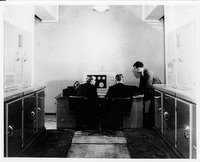 The title refers not to the Alfred Hitchcock movie with Jimmy Stewart but in fact the book by David Leavitt. It's part of the Great Discoveries series by Norton Books. The last one I read was about Godel. This one, by no grand plan of my own, is about Alan Turing and it stands nicely as a followup to the Godel book for reasons that will become apparent. I'll do a quick review of the book and then I'll do a second post on Turing's work that is related to Godel.
The title refers not to the Alfred Hitchcock movie with Jimmy Stewart but in fact the book by David Leavitt. It's part of the Great Discoveries series by Norton Books. The last one I read was about Godel. This one, by no grand plan of my own, is about Alan Turing and it stands nicely as a followup to the Godel book for reasons that will become apparent. I'll do a quick review of the book and then I'll do a second post on Turing's work that is related to Godel.The structure is quite similar to Goldsmith's Godel book - part explanation of his work and part explanation of who he is. In Turing's case this means explaining his work on decidability, computers, and Enigma and also explaining his isolation, his homosexuality, and his eventual suicide. This isn't as strong a showing as Goldsmith's book on Godel. Leavitt isn't as clear a writer when it comes to his mathematics and I never get a read on Turing the man. But that doesn't stop it from being a solid read and worthwhile if you are interested in the father of computer science.
Godel had much in common with Turing. They were both outsiders. Introverts with much of the rest of the mathematics community. Both would have lives that would end sadly. And both oddly had a fascination with Snow White and the Seven Dwarves. The film would hint at Turing's ultimate death at the hands of a self-poisoned apple.
Part of what makes Turing endearing is his absolute computer-like interpretation of words. Again this is similar to Godel who thought language was ill suited for communicating with people. When he was asked for the solution on a math test he just provided the answer. When asked why he didn't show his work, he responded that the question didn't ask him to do that. And when he worked in the U.S. he was taken aback at the common reply, "You're welcome". Thinking literally that people wanted to him to feel like he belonged. His personality was computer-like.
Turing's intelligence was clear from an early age. But his isolation often caused him to discover things that were already discovered. Even his work on decidability (I'll talk about this later) was ultimately second to a researcher (Church) in the U.S. However, Turing lucked out because his work was much clearer and the approach itself was a new take on solving mathematical problems.
 It's clear Turing didn't view his homosexuality as something to hide or curtail even though it was illegal in England at the time. Eventually, in 1952, he was convicted of acts of gross indecency. Instead of a jail term he barbarously was forced to undergo estrogen treatment leading to the growth of breasts. His security clearance was revoked and he could no longer work on cryptology for the British intelligence agency he was working for. His suicide and his ultimate motivation for it is a little unclear in detail but it's pretty easy to put the pieces together. All that is known is that he died of cyanide poisoning from eating a cyanide-laced apple.
It's clear Turing didn't view his homosexuality as something to hide or curtail even though it was illegal in England at the time. Eventually, in 1952, he was convicted of acts of gross indecency. Instead of a jail term he barbarously was forced to undergo estrogen treatment leading to the growth of breasts. His security clearance was revoked and he could no longer work on cryptology for the British intelligence agency he was working for. His suicide and his ultimate motivation for it is a little unclear in detail but it's pretty easy to put the pieces together. All that is known is that he died of cyanide poisoning from eating a cyanide-laced apple.At the end of the book though I neither felt I knew Turing or really understood him. That could be because there doesn't seem to be a lot of source material on Turing. But I can't help but feel let down by the book. His life seems so interesting on the surface but I just didn't find myself engaged in Turing by the end.
The book does cover all the important phases of his work and luckily for me semi-glosses over the hardcore details of his work on breaking the Nazi code device, Enigma. A good source about Bletchley Park and Turing's Enigma work is the Simon Singh's The Code Book. But does a decent job of explaining his work on decidability.
As I said before a reading of Godel's work is a nice segue into Turing's work. This is because Turing gave an answer to the important third part of Hilbert's call to mathematicians. Recall Godel proved that statements could be true without being provable. If everything was provable then inconsistencies would arise in your formal system. Completeness and consistency. Two of the desires of Hilbert shot down by Godel. Mathematicians in search of solutions to unsolved problems were now denied any assurance that there was a pot of gold at the end of their work. What's the third desire? I'll make a separate post on that topic and Turing's work.

No comments:
Post a Comment